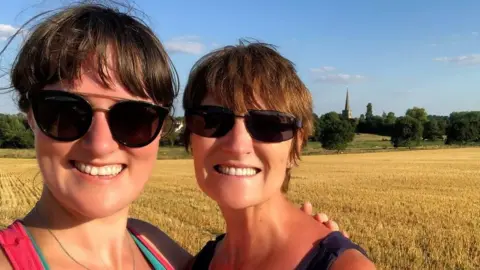 Getty Images
Getty ImagesThere is an unacceptable variation in waits for treatment of different cancers in England, an exclusive analysis for BBC News by Cancer Research UK shows.
Patients with cancers affecting the head and neck and bowel are the most likely to face long waits – just over half are seen within the target of 62 days.
In comparison, patients with blood, bone marrow and skin cancers are the most likely to start treatment in time.
The charity said the differences were putting lives at risk, highlighting a study suggesting a four-week delay to surgery increases the risk of dying by 6-8% for many cancers.
Jayne Gray, from Leicestershire, died in 2021, aged 64, after bladder cancer led to kidney failure.
Despite a history of cancer, Jayne had waited 74 days for treatment to start, after an urgent referral from her GP.
Bladder cancer is a type of urological cancer, which the Cancer Research UK analysis shows has one of the longest waits.
 Amy Gray
Amy GrayJayne’s daughter, Amy, 38, said: “It was torture waiting for her treatment to start – she should have been a priority.
“We will always be left wondering whether it would have been different if she had been seen more quickly.”
Cancer Research UK said various factors were behind the differences in waiting times, including more acute shortages of specialist staff for some cancers and the fact some could take longer and were more complex to diagnose.
Some also have more referrals than others.
There has been a surge in bowel-cancer referrals, for example, due to greater awareness following the death of “Bowelbabe” Dame Deborah James.
Cancer Research UK evidence and implementation director Naser Turabi said such long waits were unacceptable.
“Cancer patients deserve to be treated on time regardless of their cancer type,” he said.
“The new government has a huge opportunity to turn things around and ensure cancer wait time targets are being met by the end of this parliament.
“But there are no quick fixes and long-term planning and reform is essential.
“A 10-year plan which provides the NHS with additional staff alongside key diagnostic equipment will bring down waiting lists and save lives.”
The 62-day target has not been met since:
- 2015 in England
- 2012 in Scotland
- 2010 in Wales
- 2009 in Northern Ireland
And in England alone, more than 300,000 cancer patients will miss the target over the next five years unless performance improves, according to Cancer Research UK modelling, which predicts an above 20% rise in referrals.
Its latest analysis comes just a week after the health service’s performance was heavily criticised in a government report by NHS surgeon and independent peer Lord Darzi.
A Department of Health and Social Care official said: “Lord Darzi’s investigation found that cancer is more likely to be a death sentence for NHS patients than patients in other countries.
“This is completely unacceptable.”
The department would set out a 10-year plan to radically reform “our broken NHS”, in the spring, the official said.
“We will fight cancer on all fronts – through prevention, diagnosis, treatment and research – to give people the care they need,” the official added.
NHS England said more work was needed to address “some unacceptably long waits” but the health service was now carrying out more checks than ever and there were signs of progress, with the overall numbers starting treatment within 62 days showing some improvement.




